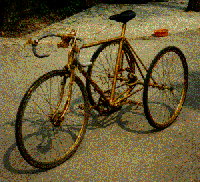| [Exercise] John C. G. Sturdy |
![[John's home]](../home.png) Last modified: Sun Jun 10 22:09:51 GMT Daylight Time 2007
Last modified: Sun Jun 10 22:09:51 GMT Daylight Time 2007
|

Serious tricycling seems to be an British peculiarity. (At least, most Brits seem to think I'm pretty peculiar... everyone else assumes I'm just British).
Riding a trike is very different from riding a bike; you have to re-learn how to balance and steer. I (like most people who have tried) found it very difficult at first! But now, not only do I prefer the trike in general, but I can also switch rapidly between trike and bike without confusion! It's great in traffic, as you can stop without taking your feet off the pedals, and start again without having to put them back onto the pedals; NB Once you've learn to ride a three-wheeler, remember to put a foot on the ground next time you stop on a two-wheeler!
Although it's possible to get trikes with differentials, mine, like most, has a single drive wheel (the left wheel; being lower on the camber of the road, it pushes you up the slope). This gives wonderful manoeuverability, in that (in one direction only) you can slew round on the spot like a crawler vehicle, with the idler wheel going backwards. However, this does create the problem that the idler wheel eats tyres (because the only restriction on turning circle for a trike is that the drive wheel keeps going forward, the idler can even go backward, thus slewing about the centre of the axle, or turn about its contact point, which is obviously not good for it). It's just one of those things.
I built the trike myself, with a Ken Rogers conversion kit (which consists of a trike axle and assorted other pieces). I used it round Cambridge quite a bit; when I moved to Bath for a few years, the trike remained at my parents' house receiving very little use; I then revived it, and repainted it all in one colour so it no longer looked so patched-together. This photo shows it just after I had painted it... I then added more parts, as can be seen in the photo of trike and trailer below. Now, it gets occasional use, I hope to increase this soon!
Since. under UK road law, trikes with the saddle over 23" above the ground are required to have more than one brake, you'll either need a hub or disc brake on the front wheel (rear wheel brakes are too fiddly) or send the forks away to have cantilever bosses brazed on to front and rear surfaces of the forks. Mine has a hub brake; I might sometime change this to cantilevers, as it breaks spokes quite a lot, and I suspect the asymmetrical hub is partly to blame for this (given the unusual forces on cornering).
You can't buy the rear wheels, as such, but have to make them, or get them made... the truing isn't as critical as on a bike. They must be about the easiest kind of cycle wheel to make, if you want to try but haven't done any before. The front, if you use a hub brake, is one of the harder ones... probably worth getting made for you, unless you're expert... I got mine made professionally, and it's not really good enough. I guess I'll have to become my own expert on that! The problem is the sideways forces on cornering, which bike wheels don't normally get.
Another slight problem that I've found recently (now that I've added a rear carrier, to hold double lights, and got a pannier to go on it) is that there's not much room between a rear carrier and the wheels -- just enough for panniers, but you have to do the pannier straps up tightly and tuck the ends in, to avoid them catching in the spokes. But then, for anything but a small load, I prefer trailers anyway.
The latest additions are profile bars, and a carrier for a new lighting system, with a wide beam to carry a rear light at each side.
It seems that often people assume that trikes are only for people who can't ride bikes... for example, who have never learnt to balance. As far as I know, tricyclists are typically well above average for experience on two wheels, and have just wanted to try a bit of a change... perhaps not anticipating just how much of a change it is. Also, trike riding very definitely does require a sense of balance, although in a different way from bike riding.
There may be some circumstances in which it's possible to ride a trike but not a bike, or at least, a lot more comfortable. For example, when I damaged an ankle ligament years ago, I was very glad to be able to cycle without having to put a foot down at junctions! If you're anticipating not being able to ride a bike for a while (for example, because of a planned operation), allow some time for learning to ride a trike... they are very different from bikes in handling, and it would be as well to get used to that before you have to get used to the effects of the surgery. It is quite easy to fall off a trike until you're used to them!
Here are some more trike pages:
| [Exercise] John C. G. Sturdy |
![[John's home]](../home.png) Last modified: Sun Jun 10 22:09:51 GMT Daylight Time 2007
Last modified: Sun Jun 10 22:09:51 GMT Daylight Time 2007
|